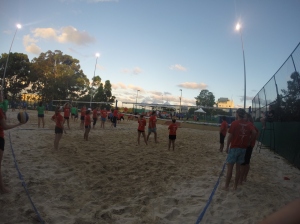By kennatim
As an American studying abroad in Ireland, I have experienced a lot of familiar things. I did not care to take the leap into complete going to a completely different cultural like studying in Thailand or Cameroon. I live on a very average college campus here in Dublin, stay a short bus ride from an international city, have spent way too much time at a Burger King in that city, and otherwise enjoy most of the average amenities I have back home. Everywhere you look, you see American culture having its influence. My friends and I even enjoyed burgers at an Old Glory themed restaurant named “Captain America’s.”
The trip has not been without cultural differences, though. My trips to the supermarket sadly recognizing no brand names, cars on the other side of the road, heavy accents, and ever-calculating conversion rates all act as my hourly reminders that I am in a foreign country.
One of the biggest and most obvious cultural differences, especially coming from GW, has been that almost all Irish students travel home each weekend. Dublin City University is a pretty traditional university in a suburban area close to a city, with on-campus accommodation, a gym, convenience store, etc. DCU, unlike GW, looks a lot like that college campus from movies and TV shows I used to think of as a kid. But on Friday afternoons, be careful on your way to the bus stop or else you might get trampled by the mobs of Irish students armed with carry-on luggage evacuating to almost every county in Ireland to spend their weekend.
Although I only live 3 hours from GW, going home for the weekend, especially each weekend, is such a foreign concept to me. Weekends are for relaxing, hanging with friends, and spending Sunday night in the library. At each university in Ireland, students go out to bars during the week, find a little bit of time to study, and spend Friday to Sunday with family at home and often at a part-time job in their home counties.
When you think about it, it makes a lot of sense. On a small island of only five million people, your hometown network is prioritized. Your primary school friends can often become your friends for life, as you may move back to your county after school. For example, my roommate lives in County Kilkenny, less than two hours from Dublin. He returns each weekend to tend to his family’s farm, spend time with his family and friends, and work at a local SuperValu supermarket. When I explained how rare it is for an average GW student to go back home so frequently, he was dumbfounded.
I guess in a country approximately the size of Indiana with a decent public transportation system, this should be expected. If I was from Indiana and went to school there, I would probably visit home more frequently, too. But walking around campus on a weekend, with every store closed and an eerie quiet about the whole grounds, it is hard to not remark at how different it is that it seems EVERY student is home EVERY weekend.
This life of the typical Irish student, to me, has its positives and negatives. While I would love to spend more time with my family, I cherish my GW weekends hanging out and doing homework with my friends. You can be sure that I would not want to spend any more time on the Megabus. I am eager, though, to experience more differences in the life of a DCU student for my short time here. And I will definitely continue to enjoy my quiet weekends on campus.





